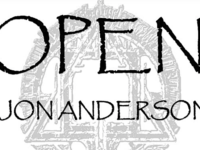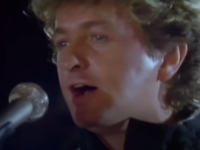Jon Anderson’s 1000 Hands is a joy (Yes!) album recorded over some time with a cast of just about everybody. To namecheck a few: Steve Howe, Chick Corea, Jean Luc-Ponty, Chris Squire (RIP), Billy Cobham, Allan White, Larry Coryell, and Ian Anderson.
Fears of Yes’ over-cooked Union are quickly put to rest, as this music is quietly filled with spaces — the kind of spaces between the notes in which Claude Debussy was said to find his muse and that “fawn” was about to find its “prelude.”
A personal observation: I was doing yard work when my neighbor waved and yelled, “We’re going to hell in a handbasket!” Well, what with coronavirus and all the sadness and anger, he had a point. But this album was playing in my earphones with music that levitates the soul: Yeah, love, the moment, now, the inner spirit, and perhaps a few leftover thoughts from those footnotes found in The Autobiography of a Yogi do tend to flit into a breeze, and they were a fresh drink of cool spring water in a hot and tough afternoon in America.
John Fogerty said of playing at Woodstock, “It was a scene from Dante’s Inferno. … All these intertwined young people, half naked and muddy, and they all looked dead.” But “some guy a quarter a mile away in the distant night flicked his lighter, and I heard him say ever so faintly, “Don’t worry John! We’re with ya!’” Jon Anderson’s 1000 Hands, even during a heavy day, manages to “flick that lighter.” And my neighbor and I still managed to wave. And that wave is like a soft landing on any welcoming planet.
The opening tune “Now” (which is much sooner than “soon”) is just like that. It’s a brief voice and guitar introduction with a quasi-Eastern Zen ethos. “Ramalama” follows with a voice-looped collage, not unlike “We Have Heaven,” but with expanded colors. By the way, Anderson’s voice is as weird and wonderful as first heard (personally) on “Your Move.” The tune explodes like one of those time-lapsed flower blossoming films with tabla percussion, violin, and a sitar soundtrack – all of which echo the warmth of the Beatles’ “All You Need Is Love.”
Then, “First Born Leaders” glances back at the true Yes sound — with a catchy reggae danced pulse, and horns! This music finds its headwaters in, to quote the brilliant Irish band Horslips’ Book of Invasions, “the mystery of the lake when the water’s still” and in “the laughter in the twilight you can hear beyond the hill.” This the very same place (and between all the notes) from which Debussy wrote.
And you know, my neighbor continued to wave into the grooves of this album. “Activate” begins with an acoustic guitar, Jon Anderson’s impassioned vocals (which reach Yes’ dramatic orbit), and then, Ian Anderson’s flute dances and duets with a hovering violin and a kalimba-thumb piano percussion. This is important music, just like “Roundabout” is important music.
Two points: Anderson’s lyrics are much more cliched with rather obvious comments about love, the inner soul’s truth, and then a lot of love, again. Gone is the rather elliptical stuff like “‘Cause its time is time in time with your time.” And, of course, as we all know, “Even Siberia goes through the motions.” But he has always been singing about love, the inner soul’s truth, and then a lot of love, again. It’s just that somewhere and sometime, he just wanted to say, “Don’t kill the whale,” and things became somewhat more obvious with age.
And, as the American Transcendental poet Ralph Waldo Emerson wrote in “Terminus,” (citing the Roman god of boundaries and limits): “As the bird trims her to gale / I trim myself to the storm of time.” But, just as the aging optimist Ralph Waldo could still pen a great poem, Jon Anderson can still make a great album. It’s just not that “close to the edge” anymore.
That all said, “Makes Me Happy” is more joy (Yes!) music that echoes the irresistible reggae pulse of Led Zeppelin’s “D’yer Mak’er” — with more added horns to boot! It’s just a delight to hear, and it conjures a favorite memory of a yearbook autograph. “Now Variation” is a brief reprise of the opening song, to remind the astute listener there is method to the melodic madness.
Ah, but “I Found Myself” is a ’50s promenade stroll with both Anderson and his wife Janee sharing vocals on the softest of songs. Yeah, it’s wedding-vow rock ‘n’ roll, but it’s really nice to know that Jon Anderson, after all the music he has given to the world, is melodically happy. And the tune is a soft cuddle.
In total contrast, “Twice in a Lifetime” gets violin and accordion complex with a dramatic vocal and a classical grandeur. “WDMCF,” short for “Where Does Music Come From,” further throws a spanner in the works and throbs with slowed folky electronic beats. And then there is “Come Up,” with Chick Corea (!) on piano, and it delves into jazz that involves Luc-Ponty, Billy Cobham, and Larry Coryell. This music simply spins into a universe of its own creation.
There’s a brief reprise with the “Now and Again” theme. Great prog rock from way back when did that sort of thing, just to once again suggest there is a method to all this madness.
You know, perhaps I was wrong: In its own rivulet way (with or without Ralph Waldo Emerson’s advice that said, “It is time to be old / To take in the sail”), Jon Anderson’s 1000 Hands sails, in a very wise way, pretty darn “close to the edge.” And with resuscitated lungs, he can still manage to flick that Woodstock lighter to illuminate the comatose darkness and sing, even after all these years, “we (still) have heaven.”
- Coincidence – ‘Coincidence,’ ‘Clef de Ciel’ + ‘Archives 1973-1974’ (2024) - November 17, 2024
- Mile Marker Zero – ‘Coming of Age’ (2024) - October 14, 2024
- Burton Cummings – ‘A Few Good Moments’ (2024) - October 7, 2024




